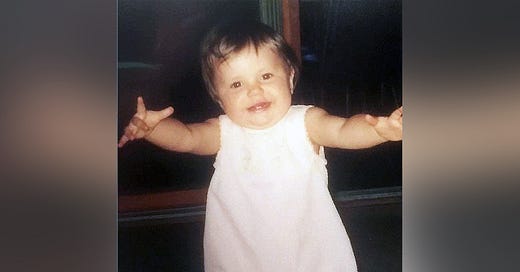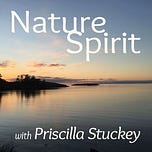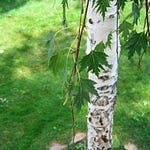Watch how a seed pops into life—always a miracle! If we want to grow a healthy tree, we try to remove all obstacles to the life force. But if human beings lack resources for growing, people often take a different view—that people are to blame for their own poverty. It’s a jaundiced view of human nature that sees us as different from all other beings. Where did this negative view arise? We make a brief sweep through the history of two ideas—original sin and the need for hard work—to show how they underlie current Republican refusals to provide pandemic relief for millions. I tell the story of the moment I glimpsed a different view of human nature from Sobonfu Somé of the Dagara people of West Africa. Now, during a pandemic, the way back to a healthy country is the same way we’d grow a healthy tree: just tender loving care. Providing all the food and support people need for life to flow through them freely again. Because people and trees are alike after all.
Transcript
I’m thinking today about how a tree grows, from a seed. So I went to YouTube, and I found some time-lapse videos, just to watch the wonder of it all over again. There’s the seed, covered in damp soil. Then a few seconds in, something magical happens. We call it germination, but that’s such a dry a word for something so marvelous.
Life springs to life. How does this happen? We do not know. The seed follows a pattern hidden deep within itself. It swells until the casing pops, and out pokes the tendril of a root. Just a tiny tip wiggling its way through the soil. The casing splits some more, and a shoot unfurls and stretches up and up and up at a ferocious pace.
The process is dazzling. It never ceases to amaze. Life jumping into being, as if out of nowhere! And it happens everywhere, in every moment. In every plant and every tree. In every animal, including every human being. That this is so commonplace does not diminish its wonder. If anything, the very mundaneness of life growing everywhere, all the time, is what renders it so extraordinary. We are swimming, every moment, in splendor.
The miracle is that all this growing goes on by itself. It works under a self-directed power. The best we can do is fall in line with it—to try to enhance the possibilities for life, especially if we want to, say, plant our favorite kind of tree in a yard or a park.
So, to grow a tree, we prepare the ground. We dig the hole and place the seed. We water it, and then we wait for that miraculous process of life to do its thing. So the tree sprouts, and the seedling forms, and it seems well on its way to becoming a healthy grown-up tree.
But then one year or one summer, something starts to go wrong. The leaves droop. The tree stops growing. So we walk out and take a good look—does it have enough water? Or too much? Is it too shaded or too bright? Has it caught a disease? Any one of these could stop the tree from growing, and we do what we can to clear the obstacles out of the way so that life can again flow abundantly through the tree’s veins.
But what if we took a different approach? What if, when the leaves started drooping, we walked out to the tree, we took a good look, and we said, “Hm, the tree has become lazy. It just wants us to keep giving it stuff.” So we stop watering it. Maybe we pull up the stakes that we had driven in to help support the trunk. We stop feeding it. What happens? Does the tree flourish?
Of course not. The very idea is laughable.
And yet this is what people have been saying, as long as I can remember, about human beings. And especially about people’s social class. If people are poor, they don’t know how to work. If they need assistance, they’re probably lazy. I’ve heard white people say it a lot about people of color. Because white folks believe in hard work, and we think that anything we have, we earned.
But it takes a pretty strong disconnection from nature to hold onto the idea that growth or abundance in life is earned in any way. You have to believe, for one thing, that humans are a different kind of being from the rest of nature—that a tree does not have to earn its right to sun or water or food, but a human being does. You have to think that the life force works differently in humans and in other beings—that a tree holds all its instructions for growing inside itself and will flourish anytime it finds good conditions but that a human being does not hold that growing wisdom inside and might actually prefer poor conditions and lack of thriving. You have to regard the life force in humans to be broken and in need of fixing.
You have to have, in other words, a pretty jaundiced view of human nature.
And Western society does. Our jaundiced view seems so natural, and so obvious, that it might take experiencing the opposite to sense a different possibility. And I remember when I saw that opposite played out in front of me.
I was at a book reading many years ago given by Sobonfu Somé, of the Dagara people of Burkina Faso, in West Africa. Sobonfu was speaking about how highly people in her village value children. And in the middle of her talk, a toddler broke away from her mama’s lap and wandered up the aisle toward the center of the room. Sobonfu stopped in mid-sentence and broke into a huge smile. She turned in her chair to fully face the little girl, she leaned over, and she said hello to the child with such obvious delight written all over her face. For a few moments they might have been the only two people in the room.
When the little girl was satisfied, she turned around and wandered back to her mother. And Sobonfu sat up again and looked at the rest of us. She explained that at home in her village, this is the normal treatment for every child. When a child enters the room, every adult turns toward the child and gives their complete attention. Children need that full attention, Subonfu said, because without it, they have trouble learning to trust themselves, and especially learning to trust the gifts that they bring into this world.
Because, she explained, children carry gifts from the world of Spirit. Every child is born because they have a special gift they need to deliver to Earth. Sobonfu liked to say, “Children are the messengers from Spirit.” She would add, “Because if we are not here with Spirit, with gifts, then what are we doing here?”
Her words touched something deep inside me. I remembered all the irritated looks getting sent toward any parent who let their child get fussy or wander around in a public setting. In my culture, that wasn’t supposed to happen. Children who did that were hogging attention. Because my culture, unlike the Dagara, believed that children are born with a deep fault lying inside them, and they need training and discipline to overcome that fault.
The idea began with the doctrine of original sin in the early Christian Church—the idea that something is so broken inside human beings that we need outside help to save us. A powerful bishop named Augustine pioneered this view around the year 400, and he fought hard to make it the official doctrine of the Church.
And a convenient doctrine it was, because during Augustine’s lifetime, the western Roman Empire was falling apart—during the exact same decades when Christianity was becoming the state religion. So here is Rome, losing political power, and here is a Church rising to power, a Church that, almost as soon as it becomes official, adopts Augustine’s idea that people are so damaged at their core that they can’t save themselves.
Original sin looks like an idea ready made for those times; it guaranteed that the Church would remain indispensable no matter what happened to Rome, because people would always need to find salvation. And in the idea of original sin, the Church solidified its power to rule an empire, because it certified the idea that human beings need authorities to rule over them. For if evil lurks inside the human heart, it will always need to be kept in check by outside powers.
A pretty clear historical line runs from Augustine in the fourth century to people in the twenty-first century who think that anyone who is poor is lazy, and the line goes roughly like this: Augustine was a hero of both Luther and Calvin, the leaders of the Protestant Reformation. They especially loved his idea of original sin. So that notion of a fatal flaw inside us became a cornerstone of Protestant thinking too.
And then the Protestants added the idea of hard work, for as the sociologist Max Weber argued, the Protestant work ethic became a way of showing that a person had been saved from their dreadful natural state of sin; if you were successful, it showed God favored you. So this idea of righteous work took hold at the very beginning of capitalism, and from there it was only a hop and a skip, historically speaking, down to American workaholism and the habit of blaming poor people for being poor.
And here’s where we come to the present moment. Because it became the hard-and-fast rule of one political party not to give financial assistance to people in need. In the thinking of the Republican Party at least since Reagan, poor people are responsible for their poverty, and outside help only discourages them from working. And it also contributes to the Republican commitment to hierarchy and social control—because today’s Republicans are the direct receivers of the ideas of original sin and the need for hard work as these ideas passed down together through evangelical Protestantism.
And this is the hill that people are dying on. Literally, now, in a pandemic. The Republican Senate is refusing to give people financial help to replace the income lost because the economy had to be closed. They’re shoveling money instead toward those who are already wealthy.
But today most of the country sees the lie in this approach. Most Americans today see the country more like the yard where we’re trying to plant a tree—millions of trees. We see that millions of us are suffering financially because our growing conditions have worsened. Millions of us have been attacked by a virus. Millions more have lost access to the basic necessities of life as jobs have ended or industries have folded. The sapling in the front yard is drooping, and it needs all the loving attention we can give it.
Because there’s only one way back to a healthy country right now, and it’s the same way we would grow a healthy tree. Just tender loving care. It means stopping the disease process—wearing masks and social distancing, where possible. It means providing food to people who have lost their jobs, or lost their way. It means creating new means of mutual aid and social support to replace all the old supports that are being lost to a pandemic. It means replacing lost income.
Just tender loving care. Same way we’d take care of a growing tree.
Because trees and people are alike after all. The idea that we need drastically different things to flourish was always a lie. It’s a lie that is rooted in seeing humans as separate from the rest of nature, and it’s a lie that grows in power the more that humans insulate themselves from nature—through placing their trust in hard work, for instance, instead of in the real source, which is the power of life itself, coursing through our own veins as surely as it does through the veins of a tree.
This life is a gift. And it flows through all of us. Every one of us. Equally. And what does it ask of us in return? Only our tender loving care to help it thrive.
Because I think the Dagara have it right—each of us has come here to bring our gifts. And what we really need to deliver them is love and care.
Just like a tree.
For digging deeper
I explored how original sin made its way through Western history in the middle chapters of Kissed by a Fox, and you can read more there, especially about the personalities who carried this idea out of theology and into the secular thought of capitalism.
I wrote up all these themes in an academic version, which became a chapter in Graham Harvey’s edited book The Handbook of Contemporary Animism (2013). My chapter is “The Animal Versus the Social: Rethinking Individual and Community in Western Cosmology.”
The idea that human nature is tainted by evil is a common philosophy behind conservative and authoritarian political regimes throughout human history. See for example, the Confucian sage Xunzi in the third century BCE, who believed that anything good in human nature is what we put there through consciously cultivating it. The Internet Encyclopedia of Philosophy article on Xunzi emphasizes his idea that human beings lack a moral compass, and the Stanford Encyclopedia of Philosophy article delves deep into Xunzi’s prescription for developing it.
Teri Kanefield is a legal expert and blogger who discusses current politics using theories of fascism. Lately she’s been focusing on the difference between people who want government to maintain hierarchy-power and those who want it to work toward equality-fairness. So she labels Republicans the Party of Hierarchy and Democrats the Party of Fairness. See “Tyranny vs. Good Government” and “More Hierarchy v. Fairness.”
Sobonfu Somé died in 2017, but a ten-minute talk she gave in Portland in 2011, including comments on children as messengers from Spirit, is available on YouTube.
There are some beautiful time-lapse videos of seeds coming to life and sprouting on YouTube, and the process is amazing every time. One with a good view of how the tips of roots wriggle through the soil is “Bean Time Lapse.”














Share this post